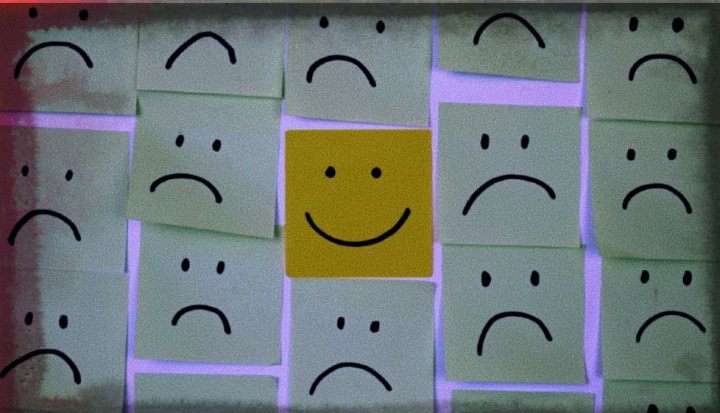There is an old saying that “money can’t buy happiness,” to which popular wit has added “but it helps!” Owning property, resting in luxury hotels on paradisiacal islands, and having access to unlimited consumption is very much like the image of happiness capitalism constructs, absolutely unattainable for the vast majority. Nowadays, however, being happy is also associated with voluntarily achieving a psychological state that is identified with productivity, being functional and proactive, and being resilient — as if it were up to us to choose between suffering or being well.
In this mindset, an optimistic view toward life is the prerequisite for achieving normality. Being grateful, being able to avoid daily stress and negative emotions, expressing ourselves in an optimistic way, getting rid of toxic bonds, and having the ability to live in the present and enjoy the “life’s little pleasures” are some of the tips that abound in the contemporary happiness market.
This idea of happiness has spawned a huge neoliberal industry in which self-care commodities range from lifestyle brands to having a positive personality “type.”
Unlike yachts, Rolexes, and diamonds, this happiness seems within everyone’s reach, and is sold through courses, cellphone apps, coaching, therapies, workshops, and the leisure, entertainment, health, and cosmetics industries. These all sell promises that they will bring us closer to happiness, but in the end it is an unattainable happiness. Along the way, we lose money and time and our expectations are shattered.
The Fake Smile
Although it may seem paradoxical, the permanent bombardment of positivity generates an anxiety that is more likely to produce the opposite of happiness. That is because if achieving happiness is entirely our own responsibility, we feel guilty when we are unable to overcome our own suffering and challenges.
The result is societies with alarming rates of anxiety, depression, and isolation — the “dark side” of that radiant, elusive image of social media, where selfie smiles and positive messages are spread.What else explains that in the country that consumes two-thirds of all antidepressants produced worldwide, the United States, positive psychology has become more and more popular? Or why have some countries, such as Japan, created governmental Ministries of Solitude?
The repression of “negative” emotions only ends in the privatization of pain and the trivialization of suffering. How can it be that we are unable to deal with circumstances that distress us when every social message we get points out that being happy depends only on ourselves? Why, we each wonder, am I the only one who lacks the willpower needed to overcome it all?
Happiness as an Ideology
Putting the goal of individual well being before everything else allows for no toleration of failure, frustration, and negative emotions. What develops instead is the association of wellbeing with selfish hedonism and a marked intolerance of frustration, which in certain doses is an emotion unavoidable in human experience.
“The disposition to opportunistically pursue the happy life is a reflection of the neoliberal invocation to self-interested, competitive conduct,” writes Sam Binkley in Happiness as Enterprise. Happiness, understood in this way in today’s capitalism, only reinforces individualism and the idea that what befalls others is “because they deserve it.”
“Positivity is not so much our condition or our mood as it is part of our ideology,” writes Barbara Ehrenreich in Bright-Sided: How the Relentless Promotion of Positive Thinking Has Undermined America. What she means is precisely that the happiness industry inculcates in us that all of our emotional states — indeed, what happens to us — is the fruit of our own actions, legitimizing the idea that there is nothing about capitalist society per se that has anything to do with our individual poverty or the wealth of a few, with our difficulties in coping with illness, or with the fact that without a word we can be fired from our jobs or evicted from our homes. It is only about our individual shortcomings, about our failure to face life with a positive attitude or our failure to see every crisis as an opportunity.
Positive psychology promises an easy solution to problems that we should at least suspect are a bit more complex. Do we need to transform society? Positive psychology’s answer is no, not at all.
Rather, positive psychology preaches that we must change the feelings that unfavorable situations provoke in us, transform anger and pessimism into inner strength and creativity, and learn to treat crisis as opportunity. We are the ones who need to adapt to overcome, survive, draw lessons from adversity with a smile, and continue to look for the happiness we deserve. Happiness then becomes an effective ideological instrument to justify inequalities.
The science of happiness has promoters who, for more than three decades, have insisted on “selling” the scientific nature of their discoveries. In this case, “selling” is not simply a metaphor, since the happiness courses and training for companies, armies, educational systems, politicians, and other clients in public or private spheres is a multimillion-dollar business. One example is the Comprehensive Soldier Fitness (CSF) program of Martin Seligman’s Center for Positive Psychology. This course was funded by the U.S. Army to the tune of $145 million. Its goal was to train the military in positive emotions, happiness, and spirituality in order to, as Seligman put it, “create soldiers who are as psychologically resilient as they are physically resilient,” which would make for “an indomitable army.”
While happiness became a successful business, however, this advice did not bring the success it predicted to millions of human beings, as we can see with a simple glance at the world we inhabit. Perhaps that is because reducing the yearning for happiness to that individualistic obsession, to the rigid control of our thoughts and feelings and to the hedonistic satisfaction of our desires can only generate impotence in the capitalist society in which we live.
Perhaps, in the face of so much inequity, arbitrariness, discrimination, and opprobrium arising from the exploitation of millions of human beings, the only thing resembling happiness is to live each day, enjoying the voluntary decision to conspire against this dismal state of affairs. That conspiracy, unlike the obligatory commodified and individualistic happiness imposed on us by capitalism, is a collective project.
First published on April 19 in Spanish in La Izquierda Diario.
Translation by Ezra Brain and Scott Cooper











